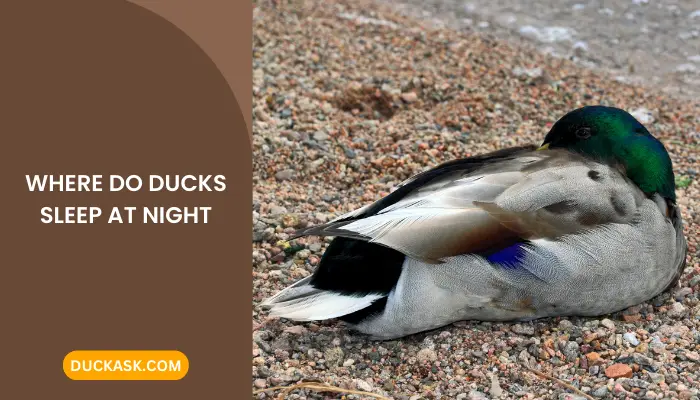What Temperature Is Too Cold for Ducks?
During winter, every duck owner has common concerns about keeping their ducks healthy and happy because they can’t roam around freely and have fun in the chilly weather.
To keep them warm and safe, you need to know what temperature is too cold for ducks. They can survive pretty well in temperatures down to 20 degrees Fahrenheit. But below this range, they can suffer from frost bites and other health conditions.
Waterfowl species like ducks have a higher body temperature that keeps them warm on colder days, but not good enough when it’s below 20 degrees.
In this article, we have discussed the cold-tolerance level of ducks along with the necessary tips on how to keep them warm and cozy in such cold days of winter.
Want to learn more about ducks habitat:
Can Ducks Survive Cold Weather?
Generally, ducks can handle colder temperatures quite easily because they have a thick fat layer under the skin to keep them warm. Besides, their fluffy feathers also play a vital role in providing warmth during winter.
Ducks living outdoors mostly have access to open water and even during winter, they often love to play and swim there.
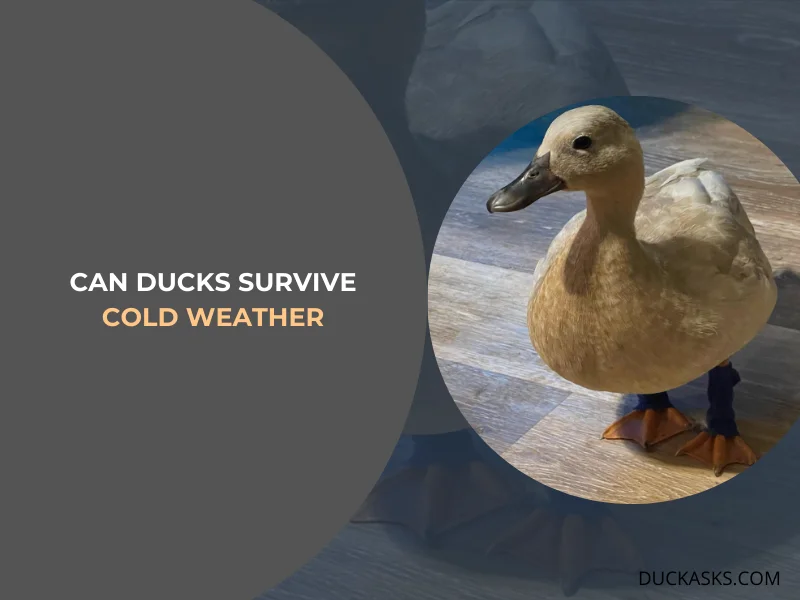
But can ducks survive in freezing temperatures if they have access to open water? Generally, in freezing temperatures, ducks can stay in the water if they have access to open water sources. They can survive quite well in such weather and also can keep them warm for a certain time.
It could be hard for them to live outside in this temperature for too long. Because they could experience mild to severe health risks that might get them into trouble.
How Cold Is Too Cold for Ducks?
Like most water birds, ducks can adapt to cold weather easily. Because of the countercurrent heat exchange system inside their body, they can sustain cold temperatures for a longer time.
Due to such a heat exchange system, the temperature of their body remains warm even though cold blood circulates through their feet while walking on cold surfaces.
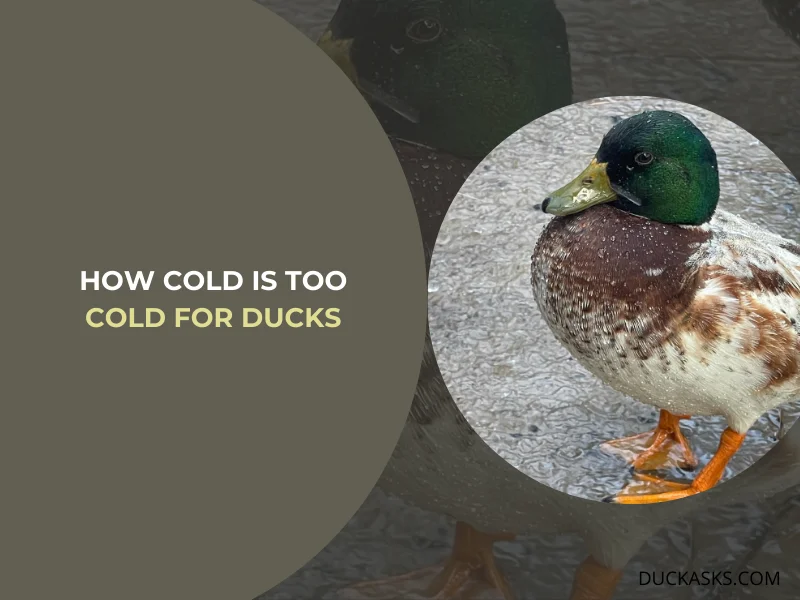
But still, there is a certain cold-tolerance level for ducks to which they can survive well during winter days. Generally, 20 degrees Fahrenheit is considered their lowest temperature tolerance level.
Beyond this temperature range, it would be too cold for ducks to survive without any assistance to keep warm in winter.
What Happens When Ducks Get Too Cold?
Though ducks have the ability to withstand cold temperatures, beginner farm owners have a common query whether can ducks sleep outside in the cold?
Actually, it depends on weather conditions whether they can pass the cold nights and sleep outside or not.
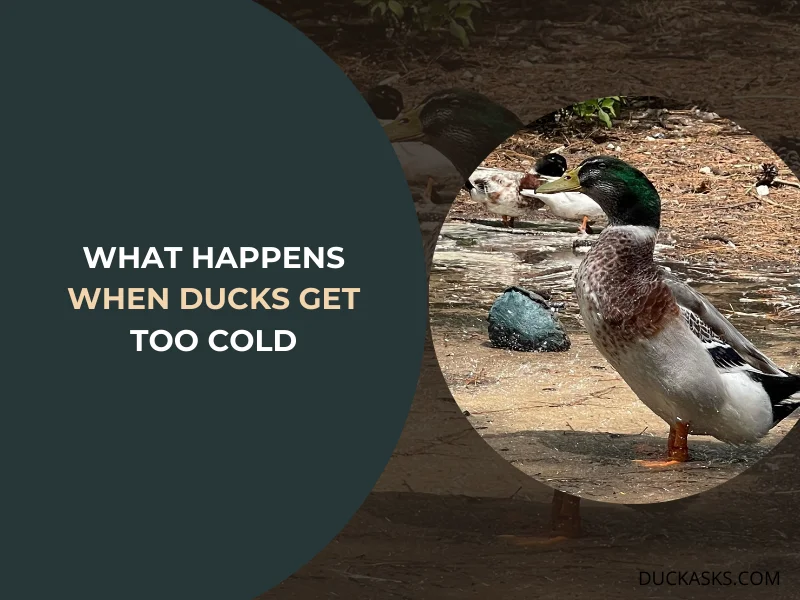
If the weather is not windy, your ducks might be okay to sleep outside. But still, it can get really difficult for them if the temperature goes down and it becomes too cold at night.
When the temperature is lower than the tolerance level of ducks, you need to provide shelter for them to sleep in such weather. Otherwise, they might experience health complications due to this.
The most prominent health complications are frostbite and hypothermia, that can occur if the ducks get too cold. Because of these health conditions, their feet might become numb and their skin might freeze.
How Can I Tell If a Duck Is Too Cold?
Ducks are one of the hardiest water birds that can withstand the severe harshness of cold weather. But still, they are not completely resistant to extreme cold.
You can know whether it is too cold for them by noticing how they are acting. Here we have discussed some signs ducks show when they are too cold and need immediate assistance to keep warm.
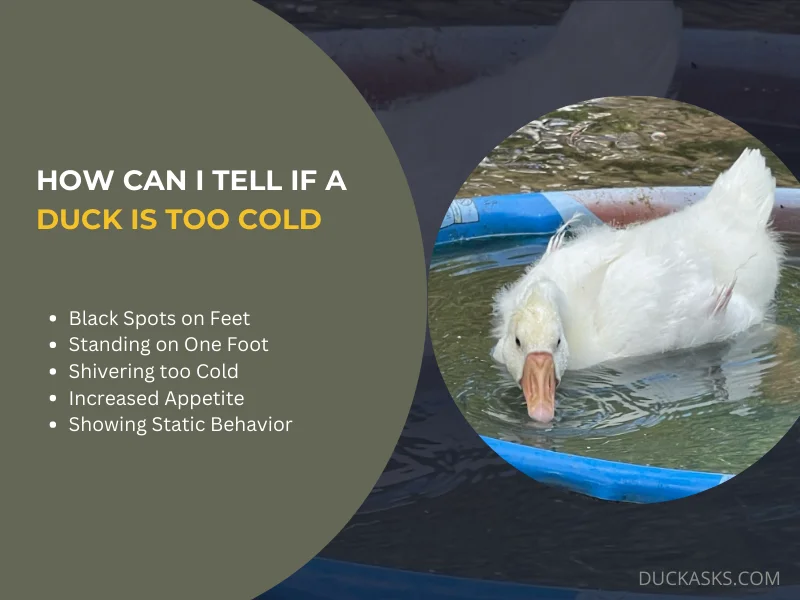
Black Spots on Feet
Frostbite, due to severe cold can result in multiple black spots on a duck’s feet. If you notice such dark areas, take your ducks to the vet immediately and ask for their assistance.
Keep your ducks in their coop and allow proper ventilation, as it can reduce the effect of frostbite. Besides, take necessary steps to reduce the humidity of their coop because increased humidity can enhance frostbites on your ducks.
Standing on One Foot
When the weather is too cold for your duck, they will have difficulty standing on their feet. In such a situation, they might continuously hobble their feet and stand on one foot.
If you notice them doing so, arrange straw or wood shavings for making warm bedding and let them lay on it. These materials have insulating properties that will keep their feet warm.
Shivering too Cold
Shaking or shivering is the most common sign of ducks feeling too cold. But they can also shiver due to infections or other health issues as well.
If you notice your ducks have wet feathers and are shivering continuously, surely, it is a sign of them being too cold. In such a situation, a warm bath will provide them comfort and help them to recover.
Increased Appetite
When ducks are too cold, they need more energy to keep themselves warm and their high metabolic rate burns calories faster than usual. So, ducks tend to have an increased appetite and consume more food than regular days.
In such cases, you should feed them energy-packed food that will provide them with higher energy and nutrition. These energy treats will help them stay strong and healthy on cold days.
Showing Static Behavior
Usually, ducks show a kind of static behavior when they are feeling too cold. It is a sign of hypothermia when they float on the water motionless and behave unusually.
If you notice these signs of hypothermia, take your ducks indoors immediately.
Cover them with a warm towel or give them a bath with lukewarm water. Additionally, you can also use a hairdryer for this purpose but make sure to keep it in low-heat mode.
How to Protect Ducks from Cold Temperatures?
In cold temperatures, you need to protect your ducks and keep them warm in a shelter. Though they can adapt to lower temperatures, it could be harmful for them to be in such weather for too long.
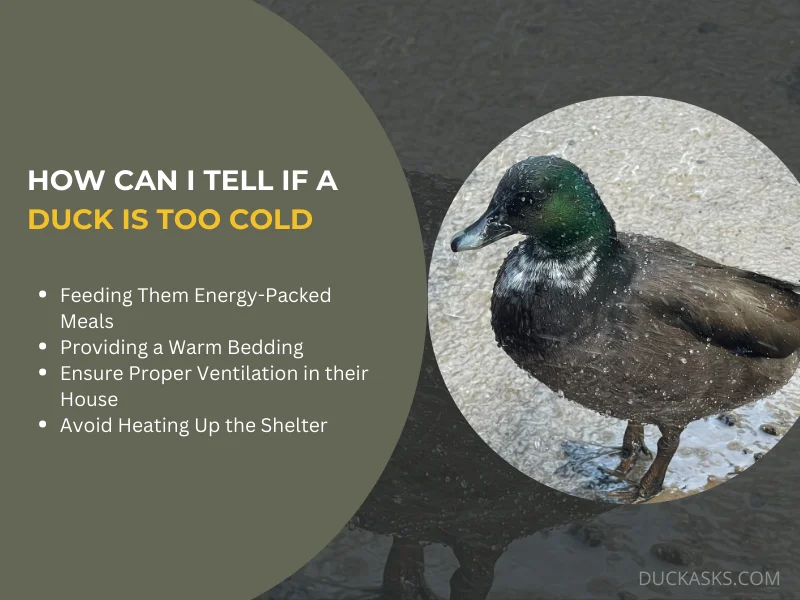
Here are some tips to protect your lovelies in colder temperatures so that they can be healthy and safe throughout the winter.
Feeding Them Energy-Packed Meals
To keep warm throughout the day, your ducks need an energy-packed meal that will give them enough nutrition and calories. You can feed them different types of nuts, oats and corn, which are high in fat and protein.
Generally, grains, grass and weeds are not available during the winter season. So, you can give them leafy green veggies like spinach and cabbage, which are nutritious options for cold days. But never opt for bread, as they can choke on it.
Providing a Warm Bedding
In cold temperatures, your ducks can be relieved with a warm shelter where they can rest and sleep throughout the night snuggling down. A bedding made of straw, hay, or wood shavings seems perfect for providing warmth on chilly nights.
You can make such bedding by spreading hay and chopped straws in layers, as these can be an excellent choice for insulating cold temperatures. Besides, keeping wooden planks beside the bedding can also help them to keep their feet warm.
Ensure Proper Ventilation in their House
It is necessary to allow air circulation inside their house to protect them from cold temperatures. As the air inside the house contains a lot of moisture, installing proper ventilation can reduce the humidity and prevent frostbite.
But make sure to lock the doors and windows of the house on extremely windy nights, as your ducks may feel too cold due to the cold air.
Avoid Heating Up the Shelter
Often duck owners think of using heaters and heating pads inside the duck shelter to keep them warm in cold temperatures. But sometimes, it could be dangerous for your lovely pets.
Heating pads are hazardous and can be flammable. There are chances of fire hazards inside the shelter because of using heating pads. So, it is better to avoid them and use wooden roofs and warm bedding to keep the shelter warm in winter.
Do Ducks Need Shelter in the Winter?
To keep your ducks out of the cold wind and prevent diseases like hypothermia and frostbite, you need to arrange an outdoor shelter in winter. Duck owners often find it difficult to figure out what kind of shelter ducks need in winter.

The following tips will help you out to build a perfect winter shelter for them and make it through the cold days comfortably.
How to Keep Ducks Comfortable in Cold Weather?
During cold weather, a proper meal and warm shelter can keep your ducks warm and comfortable. Along with this, you can follow the guidelines below to keep them healthy and happy throughout the winter.
Are Certain Breeds of Ducks More Cold-tolerant than Others?
Though ducks are hardy water birds, some breeds of them can adapt to colder climates more easily than others because of their thick fat layer and dense feathers.

We have here listed certain breeds of ducks that are more cold-tolerant than others.
- American Pekin
- Welsh Harlequin
- Muscovy
- Call
- Indian Runner
- Cayuga
- Orpington
- Blue Swedish
- Saxony
- Khaki Campbell
Mostly on poultry farms, people raise domestic ducks as they can be easily tamed and are well-adapted to the farm environment.
But can domestic ducks survive winter? Actually, domestic ducks can survive colder temperatures well because of their waterproof, fluffy and warm feathers. They love swimming outdoors and also like playing in the snow during winter.
Frequently Asked Questions
1. Can ducks survive temperatures below freezing?
Ducks can survive temperatures below the freezing point. Their cold tolerance level is down to 20 degrees Fahrenheit, which is lower than freezing temperature. But they can’t live too long below freezing temperatures as it could result in hypothermia and frostbite.
2. What temperature should I maintain in a duck enclosure?
During winter, you should maintain 90 degrees temperature in a duck enclosure. Keep the same temperature for a week and then reduce a degree per day until the indoor temperature is the same as the outdoor temperature.
3. Where do ducks go when it gets too cold?
Generally, ducks search for warm shelter and food when it gets too cold. They also look for water sources like ponds and lakes that are not frozen. During extreme cold, wild ducks often take shelter inside caves and ponds that remain partially frozen.
Closing Notes
Ducks are pretty resilient to cold and can handle freezing temperatures quite well.
You just need to take care of them by providing warm shelter and feeding them energy-dense foods so that they can have the best experience of playing and roaming around in winter.
Hopefully, this article helped you to know what temperature is too cold for ducks and when you should take measures to comfort them during colder days.
References:
- https://www.hgtv.com/outdoors/gardens/animals-and-wildlife/how-to-keep-ducks-warm-in-cool-weather
- https://www.ducks.org/conservation/waterfowl-research-science/understanding-waterfowl-winter-weather-and-waterfowl
- https://petkeen.com/cold-weather-duck-breeds/
Image Credit:
- Facebook.com/MarieSmith




